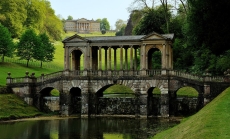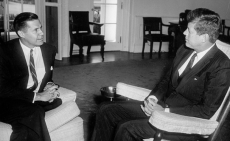The CPD Blog is intended to stimulate dialog among scholars and practitioners from around the world in the public diplomacy sphere. The opinions represented here are the authors' own and do not necessarily reflect CPD's views. For blogger guidelines, click here.
When awake with jet lag in a hotel far from home, the traveler naturally turns to the TV remote. So it was for me in Moscow this week, when a few absent minded clicks brought me face to face with Russia Today (RT)– the English language news channel and flagship for contemporary Russian public diplomacy. The channel did not come highly recommended. It had raised eyebrows with recent magazine advertisements adorned with a portrait of Stalin holding a quill and that caption: “Stalin wrote romantic poetry” and the tag line “Proud to be different... >

A recap of the third Wilton Park conference on public diplomacy in the UK.
No matter how small their post, every embassy public affairs officer who ever arranged an exchange, distributed a pamphlet, or in the jargon of contemporary public diplomacy fretted over "moving the needle" of foreign public opinion knows that a U.S. presidential election is an opportunity. Traditionally they have been animated quadrennial civics classes, dramatizing America's democratic process and contrasting starkly with the brutality with which power changes hands or not in too much of the world.

50 years after Gullion, Nicholas J. Cull looks at the origin of the term "public diplomacy."
"[T]hrough the press section of USIS that the Communist parties themselves represented at the Moscow Congress have come to know one of the most serious and dramatic documents in the Communist literature of the world."
--Pietro Nenni, Secretary General, Italian Socialist Party, 1957
This week workers at the Brooklyn Bridge chanced upon a forgotten room
containing supplies stockpiled against a nuclear attack. Dates on the
materials were evocative: 1957 - the year of Sputnik; 1962 - the year
of the Cuban missile crisis. This discovery is an oddly evocative
interruption from the high point last long war into what future
historians will doubtless see as the opening phase of the era-defining
conflict. It is like a ghost in a Shakespeare play -- reminding us of
Penn Kemble: Public Diplomat, political campaigner and international pro-democracy activist
Pages
POPULAR ARTICLES
-
June 5
-
June 18
-
June 6
-
June 5
-
June 19
-
May 15
-
June 11
-
June 5
Featured Blogger
Join the Conversation
Interested in contributing to the CPD Blog? We welcome your posts. Read our guidelines and find out how you can submit blogs and photo essays >.








